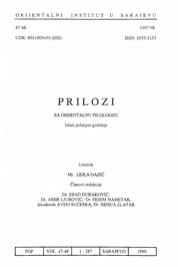HAMZA BALI VE HAMZAVILERE DAİR
ON THE HAMZEVIS AND THEIR TEACHINGS
Author(s): Cahit TelciSubject(s): Islam studies, Comparative Studies of Religion, 16th Century, 17th Century, The Ottoman Empire
Published by: Orijentalni Institut u Sarajevu
Keywords: Hamzevis; Teacings; Sunnah teaching of Islam; Hamza Bali; The Ottoman Empire;
Summary/Abstract: Sunnah teaching of Islam, which was followed by the majority of the Muslim people in the Ottoman State, was the State ideology. Occasionally, there appeared groups and individuals who did not accept such a teaching, and influenced by the sufi tradition interpreted orthodox sunnism differently. But, the State very severely fought against all those who cherished such ideas and tried to limit their influence. Existence of such groups and individuals is witnessed by rich archives documents on the basis of which we can trace the area where and the time when such groups appeared, the charges under which they were sentenced, i.e. the notion of heresy as understood at the time. Husameddin Ankaravi’s disciple, Hamza Bali, after his sheikh’s death, leaves for Bosnia to serve and there he started leading the people. At the moment when more people gathered around him, the ulama there got upset by the influence that Hamza Bali had among the people, so that after their charges against the sheikh Hamza directed to Istanbul, he was called back to the capital, where he was tried. Under the fetwa of Sheikh ul Islam Ebussuud Effendi, which he issued relying on the fetva issued by Sheikh ul Islam Ibn Kamal. Hamza Bali was sentenced to detail in 969 H. (1 5 6 1 -6 2 A .D.). His followers referred to as the Hamzevis continued their activities even after Hamza Bali had been executed. In the Muhimme defters (registers) of the Ottoman Government's Archives in Turkey (Başbakanlık OsmanlI Arşivi), there are decisions relating to the Hamzevis from 1582; also, Amiki Mehmed in 1614 wrote a risala (a treatise on the Hamzevis) in which the charges against the Hamzevis and their heresy are identical with those found in the court documents.
Journal: Prilozi za orijentalnu filologiju
- Issue Year: 1997
- Issue No: 46
- Page Range: 115-129
- Page Count: 15
- Language: Turkish

